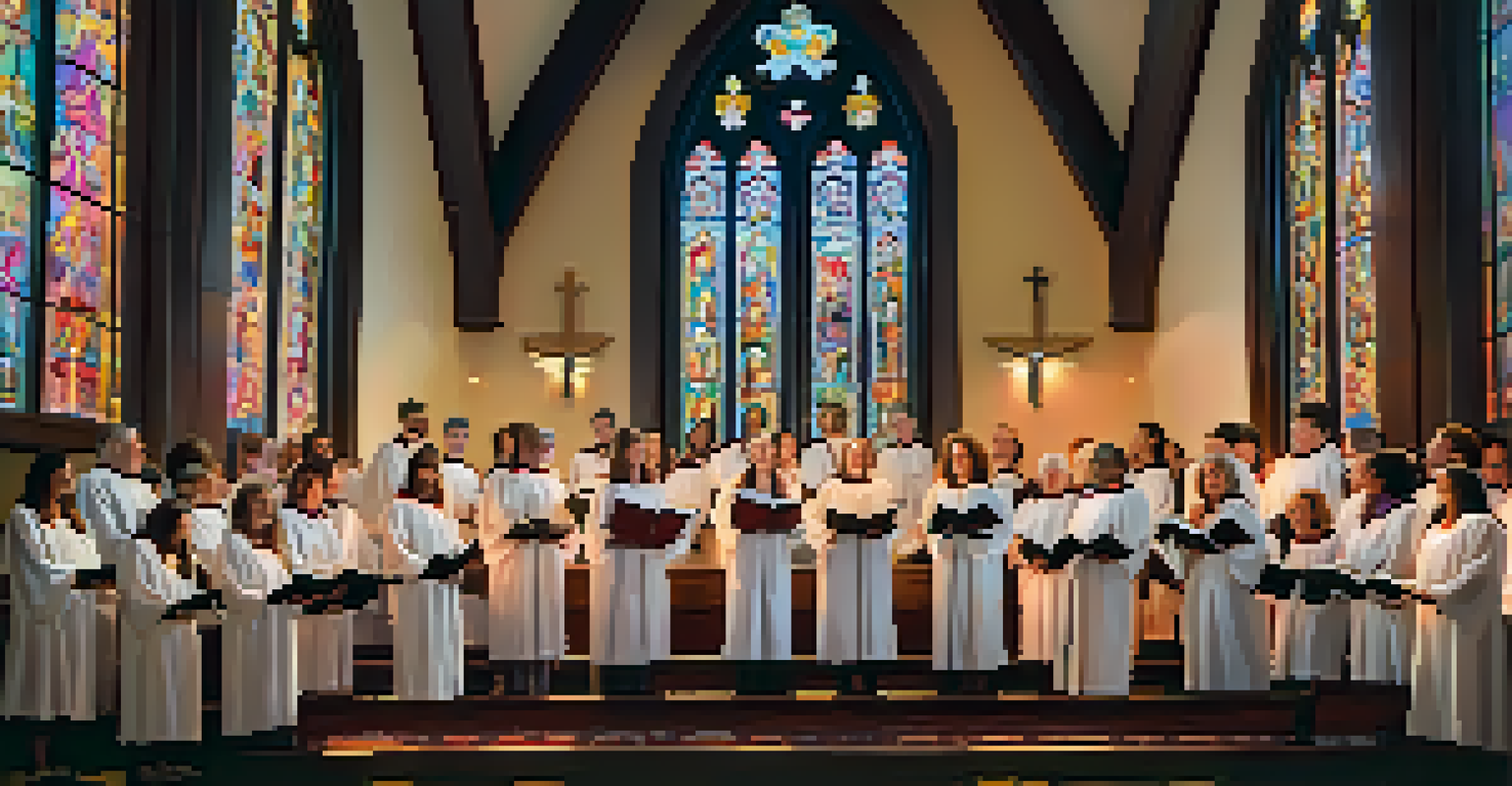Cultural Perspectives on Music and Spirituality Worldwide

The Universal Language of Music in Spiritual Practices
Music is often described as a universal language, transcending cultural and linguistic barriers. In many spiritual practices, it serves as a bridge to connect individuals with the divine or the sacred. For instance, chanting in Buddhism or the use of gospel music in Christianity illustrates how melodies and rhythms can evoke profound feelings of spirituality.
Music can change the world because it can change people.
Beyond its emotional impact, music also plays a functional role in spiritual rituals. It can facilitate meditation, enhance worship experiences, and create a communal atmosphere among participants. Think of how a choir's harmonious voices can uplift an entire congregation, fostering a deep sense of belonging and connection.
Moreover, different cultures utilize music in unique ways to express their spiritual beliefs. From the call to prayer in Islam to the rhythmic drumming in African traditions, these musical expressions reflect the diverse ways humans seek to understand and connect with their spirituality.
Indigenous Music and Its Spiritual Significance
Indigenous cultures worldwide often weave music into their spiritual fabric, making it a core aspect of their identity. For many Native American tribes, for example, ceremonial songs are believed to carry the voices of ancestors, guiding and protecting the community. This deep-rooted connection highlights how music can serve as a vessel for ancestral wisdom.

In Australia, Aboriginal music is equally significant, with songs that narrate stories of creation and the land. The didgeridoo, a traditional wind instrument, is not only a musical tool but also a spiritual one, used in rituals to invoke the presence of spirits. This illustrates the belief that music is not just art but a sacred act.
Music as a Spiritual Connector
Music transcends cultural barriers, serving as a vital bridge to connect individuals with the divine in various spiritual practices.
By honoring these musical traditions, Indigenous peoples preserve their cultural heritage and spiritual beliefs. The act of singing and playing instruments becomes a communal experience that strengthens bonds and reinforces a shared spirituality, showcasing music’s role in cultural continuity.
The Role of Music in Eastern Spiritual Traditions
In Eastern spiritual traditions, music often plays a central role in practices like yoga and meditation. In Hinduism, for instance, devotional songs known as bhajans are sung to express love and devotion to deities. These melodies not only inspire participants but also promote a sense of peace and connection to the divine.
Where words fail, music speaks.
Similarly, in Buddhism, chanting sacred texts is a way to cultivate mindfulness and focus the mind. The repetitive nature of these chants can lead to a meditative state, allowing practitioners to delve deeper into their spiritual practice. This connection between music and meditation highlights the therapeutic benefits that music can provide.
Moreover, traditional Asian instruments, such as the sitar and bamboo flute, enhance spiritual experiences by creating soothing soundscapes. These instruments embody the philosophy of balance and harmony, further illustrating how music is intertwined with spiritual well-being across Eastern cultures.
Western Music’s Evolution in Spiritual Contexts
Western music has undergone significant evolution, particularly in its relationship with spirituality. From medieval Gregorian chants to contemporary Christian rock, music has been a fundamental aspect of worship and spiritual expression. This evolution showcases how cultural shifts can redefine the role of music in spiritual settings.
In many Western churches, music is now a key component of the worship experience. Hymns and contemporary songs create an emotional atmosphere that encourages congregation participation and personal reflection. This highlights how music can shape spiritual experiences, making them more accessible and relatable.
Indigenous Music's Cultural Role
For Indigenous cultures, music is intricately woven into spiritual identity, acting as a vessel for ancestral wisdom and communal bonds.
Furthermore, the rise of music festivals and events like Coachella has seen spirituality woven into popular music. Artists often incorporate themes of love, connection, and transcendence, which resonate deeply with audiences seeking spiritual fulfillment. This shift illustrates that spirituality in music can take many forms, evolving with societal changes.
Healing Powers of Music in Spiritual Practices
Music has long been recognized for its healing powers, particularly in spiritual contexts. Many cultures embrace music therapy as a means to promote emotional and spiritual well-being. For example, sound baths use harmonic sounds to induce relaxation, helping participants release stress and reconnect with their inner selves.
In various religious traditions, music is also used to facilitate healing rituals. In African communities, drumming is employed during ceremonies to heal both physical and spiritual ailments, demonstrating the belief in music’s power to restore balance. This underscores the idea that music can transcend mere entertainment, serving as a vital tool for healing.
Additionally, modern research supports these ancient beliefs, showing that music can lower anxiety levels and improve mood. By incorporating music into spiritual practices, individuals can enhance their overall wellness, illustrating the profound connection between music, spirituality, and health.
The Influence of Technology on Spiritual Music
The advent of technology has dramatically transformed how music is created, shared, and experienced in spiritual contexts. With platforms like Spotify and YouTube, individuals can access a vast array of spiritual music from around the globe. This democratization of music allows for greater diversity and fusion of spiritual sounds, enriching personal practices.
Moreover, technology enables musicians to reach wider audiences, creating new spaces for spiritual connection. Online worship services and virtual concerts allow people to participate in communal experiences from the comfort of their homes, especially important during times of social distancing. This shift highlights how technology can enhance, rather than detract from, spiritual engagement.
Technology's Impact on Spiritual Music
The rise of technology has transformed the accessibility and sharing of spiritual music, enriching personal practices while maintaining authenticity.
However, as we embrace these innovations, it’s essential to remain grounded in the authenticity of spiritual music. Balancing the use of technology while respecting traditional practices ensures that the essence of spirituality remains intact, fostering a deeper connection between music and the divine.
Cultural Appropriation vs. Appreciation in Spiritual Music
As global connectivity increases, the lines between cultural appropriation and appreciation in spiritual music can often blur. While borrowing elements from other cultures can foster understanding and connection, it can also lead to misrepresentation and disrespect. Navigating this delicate balance is crucial for maintaining the integrity of spiritual traditions.
For instance, when artists incorporate Indigenous sounds or practices into their music, it’s essential to acknowledge the origins and significance of these elements. Failure to do so can lead to cultural appropriation, where the original context is overlooked. This highlights the importance of education and sensitivity in how we engage with cultural practices.

Ultimately, fostering genuine appreciation involves learning from and uplifting the voices of those from whom we draw inspiration. By honoring the roots of spiritual music and promoting inclusivity, we can create a more respectful and enriching musical landscape that celebrates diversity.